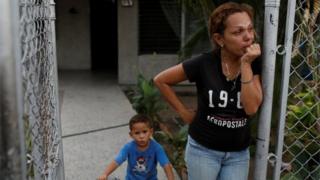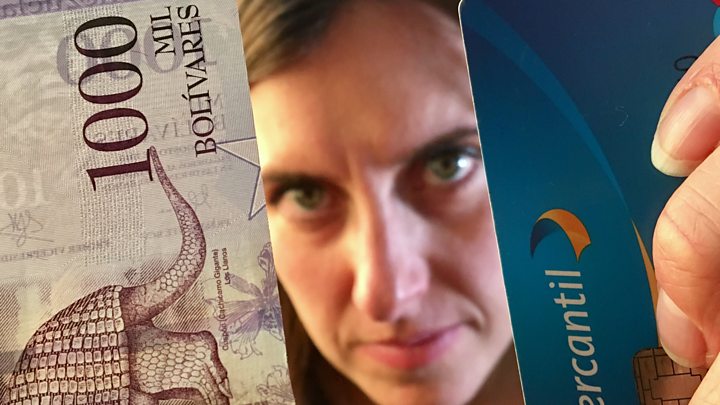Home » Latin America »
Venezuela crisis: A country in freefall
Venezuela’s economy is in freefall. Hyperinflation, power cuts, and food and medicine shortages are driving millions of Venezuelans out of the country. Many are blaming President Nicolás Maduro and his government for the dire state the nation is in. Here, BBC News takes a closer look at how Venezuela’s economy descended into its current crisis.
What’s wrong with Venezuela?
Arguably the biggest problem facing Venezuelans in their day-to-day lives is hyperinflation. The annual inflation rate reached 83,000% in July, according to a recent study by the opposition-controlled National Assembly.
Prices have been doubling every 26 days on average. This has resulted in many Venezuelans struggling to afford basic items such as food and toiletries.
With small items like a cup of coffee costing a whopping 2.5m bolivars until recently, it also became increasingly difficult to pay for goods in cash.
Until the currency’s redenomination on 20 August, Venezuelans needed 25 of their highest denomination notes – the 100,000 bolivar bill – to pay for their caffeine fix.
To avoid going shopping with rucksacks full of cash, Venezuelans increasingly started using electronic transfers for even the smallest transactions.
As the BBC’s South American correspondent found in Caracas, waiters handed customers their bank details trusting that the latter would transfer them the tip electronically.
How did hyperinflation come about?
On the most basic level, there are more people wanting to purchase goods than the number of goods available.
Venezuela is rich in oil, and has the largest proven reserves in the world. But arguably it’s this exact wealth that underpins many of its economic problems.
Because it has so much oil, Venezuela has never bothered to produce much else. It sells oil to other countries, and with the dollars it earns, imports the goods Venezuelans want and need from abroad.
Its oil revenues account for about 95% of its export earnings. But when the oil price plummeted in 2014, Venezuela was faced with a shortfall of foreign currency.
This in turn made it difficult to import goods at the same level as before, and imported items became scarcer.
The result: businesses increased prices and inflation rose.
Add to that the government’s willingness to print extra money and regularly hike the minimum wage in an effort to regain popularity with Venezuela’s poor, and you get money which loses its worth rapidly.
The government is also increasingly struggling to get credit after it defaulted on some of its government bonds.
With creditors less likely to take the risk of investing in Venezuela, the government has again taken to printing more money, further undermining its value and stoking inflation.
What’s the government doing about it?
The government lopped five zeros off the old “strong bolivar” currency on 20 August and gave it a new name – the “sovereign bolivar”.
It also began circulating eight new banknotes worth 2, 5, 10, 20, 50, 100, 200 and 500 sovereign bolivars and two new coins.
The new currency is part of an “economic package” of measures which the government says is the “magic formula” to help Venezuela’s battered economy recover.
Among the measures are:
How are people reacting?
Many people have been voting with their feet and leaving Venezuela. According to United Nations figures, 2.3 million Venezuelans have left the country since 2014 when the economic crisis started to bite.
The majority have crossed into neighbouring Colombia, from where some move on to Ecuador, Peru and Chile. Others have gone south to Brazil.
Venezuela has also seen more than 200,000 of its citizens emigrate to Spain. Many of them are the children of Spaniards who came to Venezuela in the 1950s and 60s, when it was seen as a place of opportunity.
The mass migration is one of the largest forced displacement in the western hemisphere.
Read: Bridge of desperation – Exodus from Venezuela
What faces those staying in Venezuela?
While the new currency is likely to make cash transactions easier for a while, its introduction caused confusion. Some Venezuelans managed to get hold of the new bills, but others reported long queues when banks opened.
Some economists have also warned that the new currency could soon face the same problems as the old one unless the root causes of hyperinflation are tackled.
They say that within months its worth could be decimated by rising prices.
Employers have also said that they do not know how they will pay for the 34-fold rise in the minimum wage.
Meanwhile, shoppers still face empty shelves in supermarkets, and in some cities there have been water shortages and power cuts caused by a lack of investment in Venezuela’s crumbling infrastructure.
But while the power cuts and lack of running water are a problem for households and businesses, they have proven deadly in Venezuela’s already run-down public hospitals.
Many of those fleeing the country say they are doing so because they cannot get the operations and medical care they need.
Pregnant women are crossing the border to give birth and mothers go to health centres in Colombia to get their babies vaccinated.
Those who cannot leave often spend days and weeks searching for the medication they need. With food increasingly scarce, child malnutrition levels are at a record high.
Who do people blame?
Some of the problems go back a long time, but since the socialist government has been in power since 1999, first under President Hugo Chávez and more recently fronted by President Nicolás Maduro, many Venezuelans blame these two men for what is happening.
They say that while the socialist policies of President Chávez may have been aimed at helping the poor – Venezuela was a country of huge inequality when he came to power in 1999 – they backfired.
Take price controls, for example. They were introduced by President Chávez to make basic goods more affordable to the poor by capping the price of flour, cooking oil and toiletries.
But this meant that the few Venezuelan businesses producing these items soon no longer found it profitable to make them.
Critics also blame the foreign currency controls brought in by President Chávez in 2003 for a flourishing black market in dollars.
Since then, Venezuelans wanting to exchange bolivars for dollars have had to apply to a government-run currency agency. Only those deemed to have valid reasons to buy dollars, for example to import goods, have been allowed to change their bolivars at a fixed rate set by the government.
With many Venezuelans unable to freely buy dollars, they turned to the black market. At one point, the dollar was trading for 6.5m bolivars.
But there is still a loyal core of people who support the government and who say that Venezuela’s problems are caused not by President Maduro or his predecessor, but by a hostile and coup-mongering opposition inside the country, and “imperialist forces” like the US and neighbouring Colombia outside it.
They say that US sanctions have hampered the government by making it hard to restructure its debt.
Often, they have benefited directly from the government’s social programmes – and argue that despite the shortages, they are still better off now than before Mr Chávez came to power in 1999.
Source: Read Full Article





